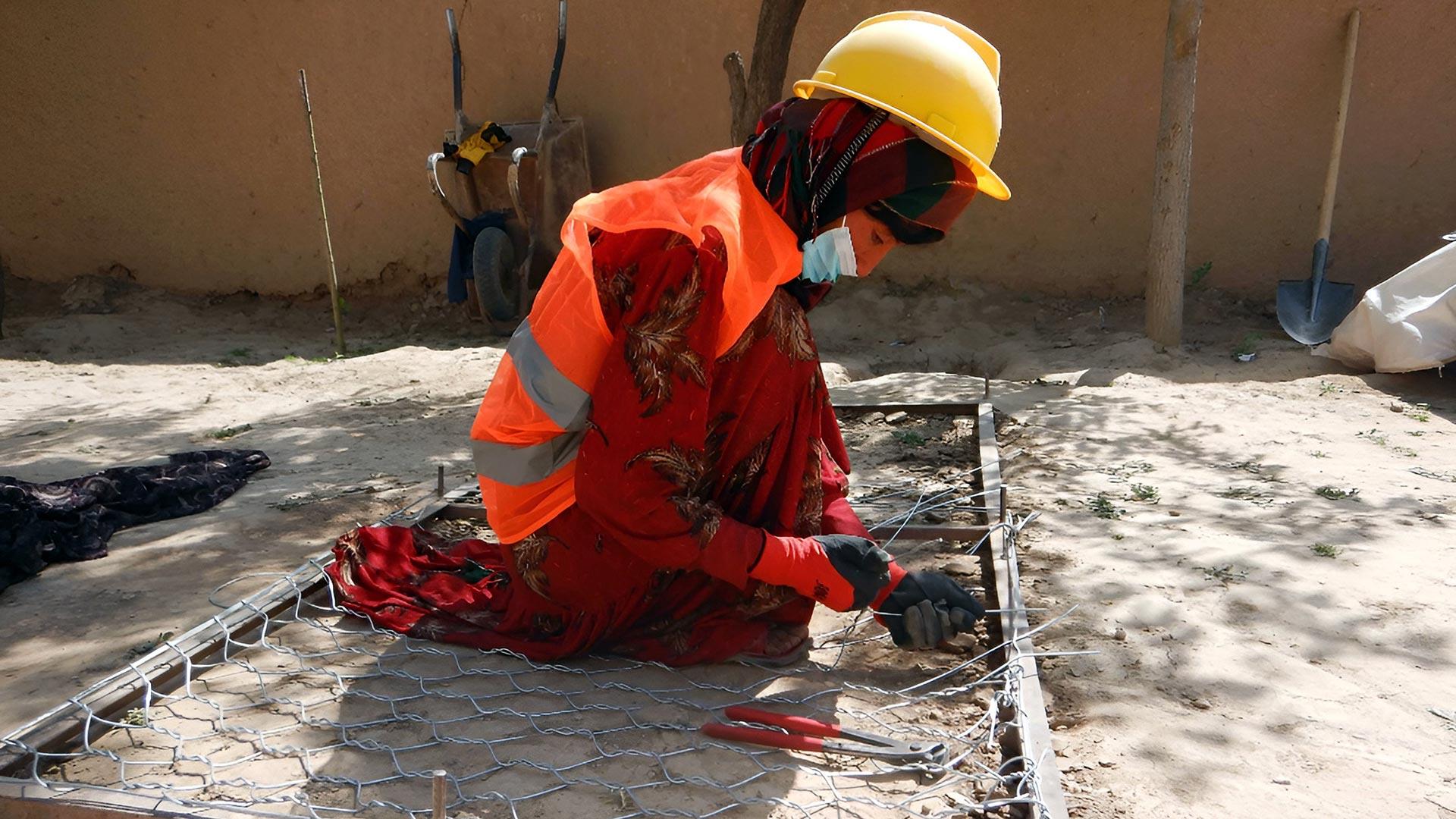
Crafting a new livelihood in Afghanistan
Wire weaving leads one Afghan woman to improve her family's economic situation
Fatema took advantage of an FAO project that taught her to weave the wire mesh holding together the stones that protect her ancient village from flash floods and soil erosion. ©FAO/Habib Hemat
02/01/2024
Nestled under the looming ruins of the ancient Nariman fortress, the village of Cheshma Shirin (meaning “Sweet Source” in Dari) is home to Fatema and her three children. Like most of the other 250 inhabitants of this village, located 30 kilometres from the provincial capital Qala-e Naw, they belong to the Sadat tribe, a minority community in Afghanistan.
These days, in order to make a living, Fatema spends her days weaving the wire mesh holding together the gabions, or cubic blocks of stones used to shore up the banks of the river, to protect the ancient village from flash floods and soil erosion. The gabions also form little dams to capture water from the increasingly erratic rainfall and irrigate the pistachio trees for which this province of Badghis in northwestern Afghanistan is renowned.
Fatema learned this essential weaving skill through a World Bank-funded project of the Food and Agriculture Organization of the United Nations (FAO). This Emergency Food Security project focused on providing urgent and essential livelihood support and health services, in addition to food assistance, to the people of Afghanistan. It complements ongoing FAO programmes, funded by the Asian Development Bank and other resource partners, which combine immediate lifesaving and livelihood-protecting assistance with activities geared toward longer-term recovery and resilience-building.


Fatema could find little work after her husband died, leaving her dependent on aid from other villagers or humanitarian assistance. With this new wire weaving skill, she can now help support her family. ©FAO/Habib Hemat
After Fatema lost her husband in a car accident, she was struggling to feed her children, with her eldest son having to quit school to help support the family. For years, Fatema could find little work and depended on the kindness of neighbors and occasional humanitarian aid. After the political turnover in August 2021, the family became even more dependent on the scant day-wages brought back by her son, in an increasingly cash-strapped economy.
When FAO began the training in gabion weaving in her village, Fatema eagerly participated. Now, she is able to carry out the weaving work at home and receive wages from a construction company through funding from FAO, and this has made a huge difference in her economic situation.
It is a necessary skill in an area that has suffered from increasingly extreme weather, with floods and droughts each in turn affecting the villages.
Many of Badghis’ inhabitants have fled these extremes and their consequences, migrating to the nearby city of Herat, sometimes ending up in camps for internally displaced people. Devastating earthquakes in October 2023, that were also felt in Badghis, were the latest in a series of challenges.
For Fatema, the FAO project offers an opportunity for her family to stay in their village rather than being forced to migrate.
“The income I earn from this activity provides for my family’s immediate needs; but the results of this project, bringing water and income to our community, also allow my children to dream about a future in the village where they were born,” said Fatema.

FAO is helping the village build up its infrastructure, focusing on irrigation which is crucial for its agrarian economy. ©FAO/Habib Hemat
The lifeline of the village, its agrarian economy, relies heavily on irrigation, which has been one of the priorities of FAO’s work in the area, supporting both large and small traditional irrigation schemes in consultation with local communities to understand their needs.
This allows the community to move beyond subsistence farming and diversify their vegetable gardens, improve crop yields and resume pistachio production previously decimated by drought. The surplus can then be sold on the market, but the village’s infrastructure, from storage and food processing facilities to transportation, will need to be developed next for these activities to truly be successful.
With a steady source of income from her newly-acquired skill in gabion weaving, Fatema gains confidence with every twist and turn of her hands. Now she will also be able to ensure that her children can get the education they deserve. As for the village, she feels the construction of dams and investment in irrigation has given the community a sense of rebirth.
The FAO Emergency Food Security project has enabled the rehabilitation of the village’s water resources while providing some much-needed cash to its men and women. But continued support will be crucial to prevent poor and food insecure populations from slipping into greater food insecurity. The agricultural sector, which is the backbone of the country’s economy, will need more investment if the improvements in lives such as those of Fatema and her family are to be sustained.
Related links
Learn more
- Website: FAO country profile: Afghanistan
- Website: FAO emergencies and resilience
- Website: FAO Afghanistan diaries

